A study by Buffer found that 98% of workers would like to work remotely in some form for the rest of their careers. We all know that working from home is an enticing concept, but there are still some qualms about embracing a fully remote lifestyle
In acknowledgement of World Mental Health Day on October 10th, we would like to discuss how remote work impacts mental health. Like everything, it has its pros and cons, but what has experience taught us so far?
What are remote work's main benefits and challenges, and which ones take the lead, according to those who have already made the switch?
First, let’s have a look at the top challenges remote workers face on a daily basis. We identified them based on the responses to several studies carried out by renowned organisations in the area of employment.
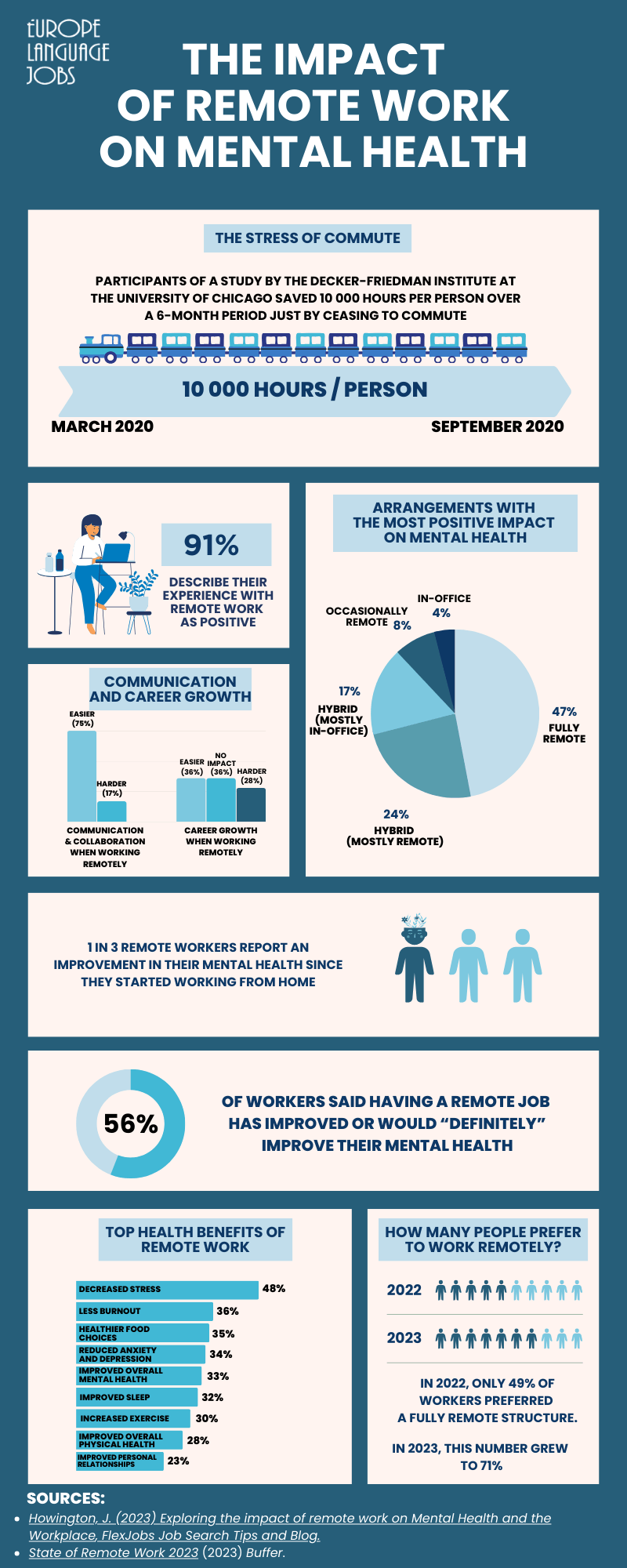
Top challenges of remote work
- Fitting into the company culture
- Developing relationships with colleagues
- Being seen and heard
- Spending too much time at home
- Loneliness
- Working overtime
- More distractions
- Limited career development
- Pay cuts
1. Fitting into the company culture
It is no surprise that we find it easier to fit in when we can interact with others face-to-face. The company culture leaves less of an impact if we aren’t physically present at the office and carry out our daily tasks according to our own rhythm.
And so, 41% of workers find it hard to fit into their company’s culture when working remotely (Owl Labs). When working remotely, it's common to feel empty and disconnected from your colleagues and the company culture, which can negatively impact your mental well-being and sense of belonging. This may result in feeling like an outsider and put a strain on our mental health.
2. Developing relationships with colleagues
This point relates somehow to the former one. Both have to do with fitting in - into the company culture, or among the colleagues.
15% of workers report challenges in collaboration and communication when working from home (Buffer). This may be because the majority of conversations occur via messaging apps for 50% of remote workers (ibid). Clearly, texting isn’t capable of replacing face-to-face interactions.
This is confirmed by 69% of remote workers reporting increased burnout from digital communication tools (Forbes).
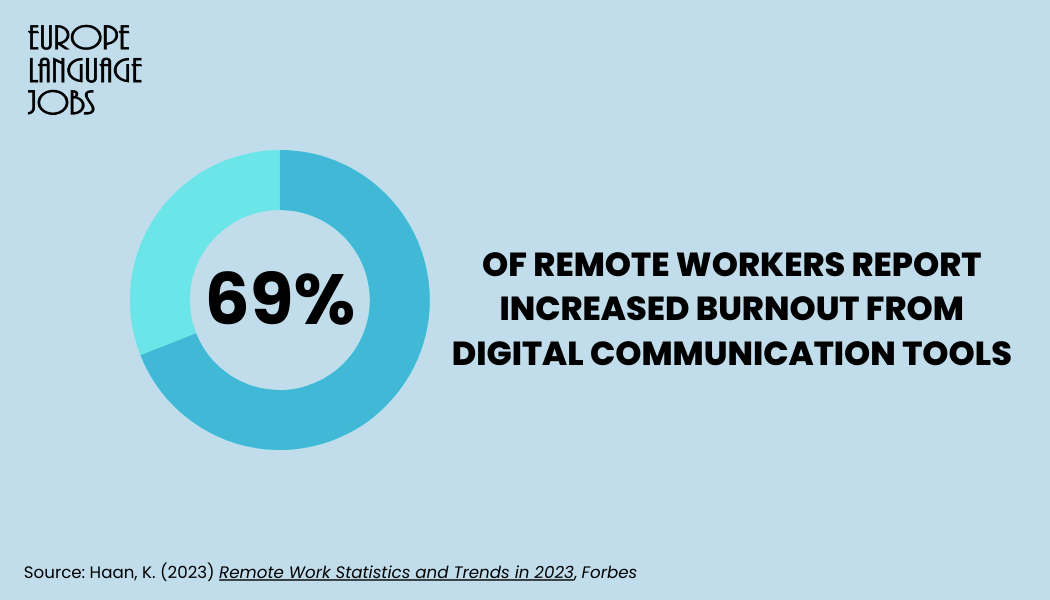
However, 71% of companies face this issue by organising regular 1:1 meetings for their remote employees. Another 60% offer a range of opportunities to connect with coworkers (ibid). This; however, can be a challenge when managing a workforce spread out across different timezones.
78% of businesses tackled this by introducing systems and tech for collaboration and communication designed especially for remote teams (ibid). And they must be doing something right, because 75% of those who work from home report feeling connected to their colleagues. What’s more, only 17% say they don’t (ibid).
Research by Flexjobs confirms this with its conclusion that 52% of remote workers believe that remote work has no impact, or even has a positive impact, on collaboration. So perhaps the devil is not as black as he is painted, to quote a classic.
3. Being seen and heard
So far, the top challenges remote workers fear are all related to the feeling of belonging and recognition. 40% of men and 28% of women working from home are stressed about not feeling seen or heard in meetings (Owl Labs). This is especially true in a scenario in which only some of the employees are working remotely, while the rest regularly visits the office.
Furthermore, 49% feel that they won’t be able to form bonds with leadership or be visible to the members of the executive board due to working remotely. This concern is somehow supported by another 49% claiming that they are more likely to ask the opinion of their colleagues working at the office with them, rather than those who work from home (ibid).
37% of remote workers surveyed by Buffer agreed that getting recognised by leadership is a common difficulty they face.
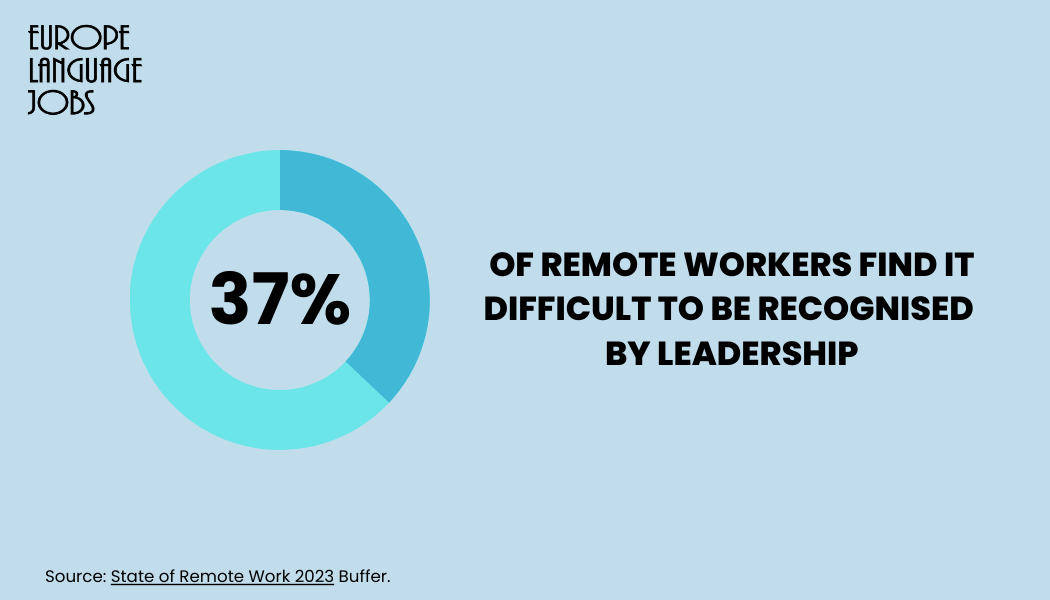
Perhaps we need to let go of old habits and certain prejudices in order to ensure equality between those working from the office and others who prefer the comfort of their own home. Stressing about being noticed just on the grounds of working arrangements is a surefire way to damage someone’s mental health.
4. Spending too much time at home
When working at the office, a big chunk of our day is spent outside of home. For some, that is a nuisance and the main factor motivating them to switch to remote work. But very often, once they do, it turns out they miss having a reason to leave every morning.
One-third (33%) of remote workers feel like they spend too much time at home, simply because they don’t have a reason to leave (Buffer). This can quickly lead to the feeling of isolation and not interacting with others often enough.
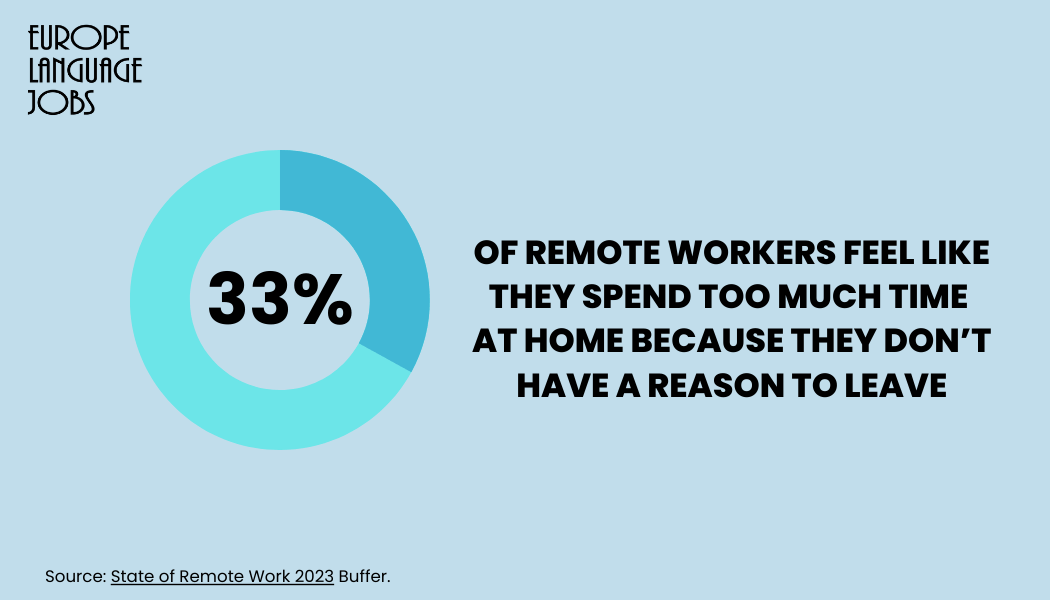
Although coworking spaces are growing in popularity, they are not yet available in every location. Additionally, monthly subscriptions often come at high costs that many freelancers or employees receiving the average wage cannot afford.
This is why home remains the primary work location for 82% of remote workers. Only 5% make regular use of coworking spaces, and a mere 2% set up their office in a café.
If you decide to join the last group, make sure to get the Reef app. It’s a great tool for remote workers, allowing you to book spots at your favourite eateries and providing discounts on meals and beverages.
5. Loneliness
Not going out often enough or being unable to connect with your colleagues can lead to one of the biggest concerns of all remote workers - loneliness.
Almost 1 in 4 (23%) remote workers struggle with loneliness (Buffer). It may not seem like a lot, but the feeling of isolation can leave long-lasting damage to one’s mental health.
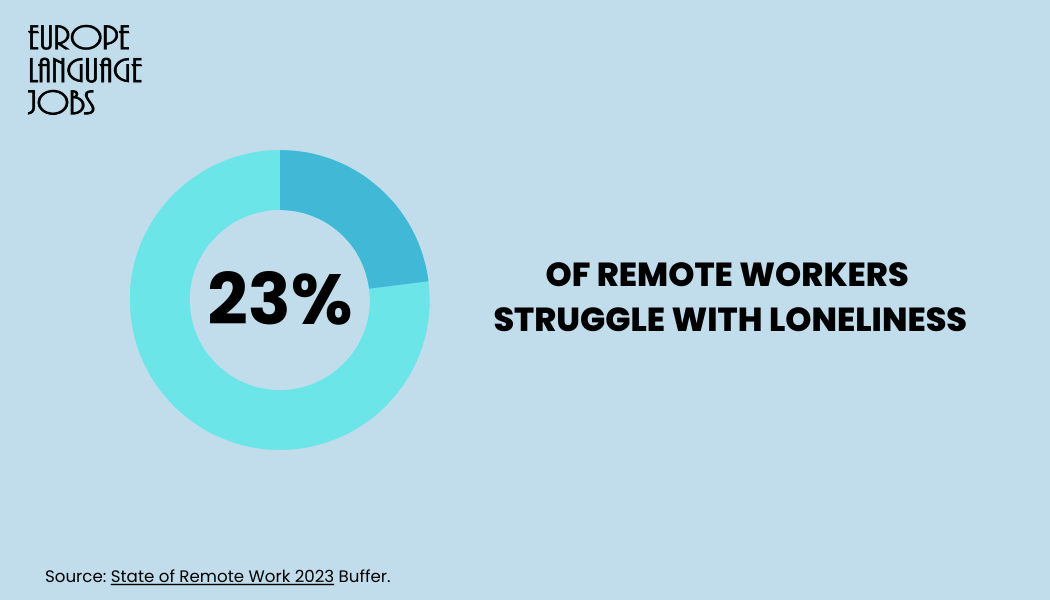
Those living alone are particularly in danger in this area. Spending entire days on your own, without the company of family or housemates can become draining very quickly - even for those who enjoy their alone time.
Luckily, there are ways to fight loneliness when working from home; and it is extremely crucial to make that effort if you find yourself in that situation. If self-help strategies haven’t eased the loneliness and it’s starting to feel unmanageable, be sure to reach out for professional support to navigate and manage these feelings effectively.
6. Working overtime
Work-life boundaries are important to 93% of remote workers (Buffer). Still, many of them find it difficult to separate work from private life when their home becomes their office.
22% of those working from home say they can’t unplug, even after their office hours are officially over (ibid). It is tempting to stay in front of your computer just a little bit longer, or check that one email if your laptop is right there.
But interestingly, almost half of workers (45%) claim that it is actually easier for them to find and maintain work-life balance when working from home than being at the office (ibid). They identify factors such as the lack of lengthy commutes and the possibility to spend the saved time on something they enjoy doing as helpful in making them disconnect.
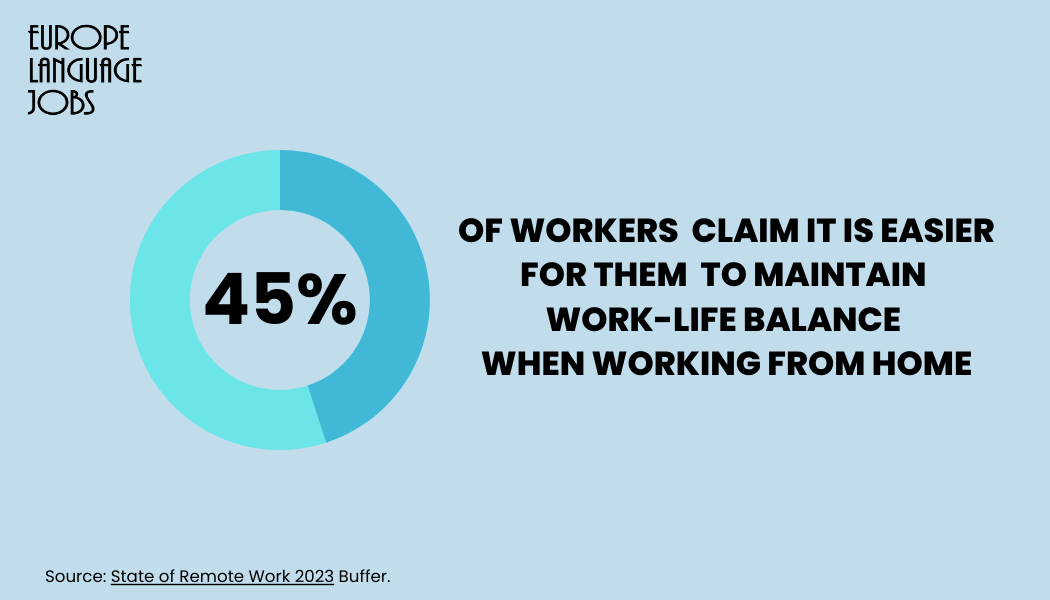
Only 1 in 5 (20%) report they work more at home than at the office. Compared to 1 in 2 who find it easier to create boundaries when working remotely, this number shows that yet again, a common concern remains just that - a concern, not the reality - for many.
7. More distractions
When talking about productivity, two opposing camps usually emerge - those who find it easier to focus at home versus others who can’t force themselves to be attentive without the awareness of being under supervision at the office.
As Buffer found out, those camps are actually divided 50/50. Half of the respondents believe that avoiding distractions is much easier at the office. The other half claims that working from home actually facilitates focused work.
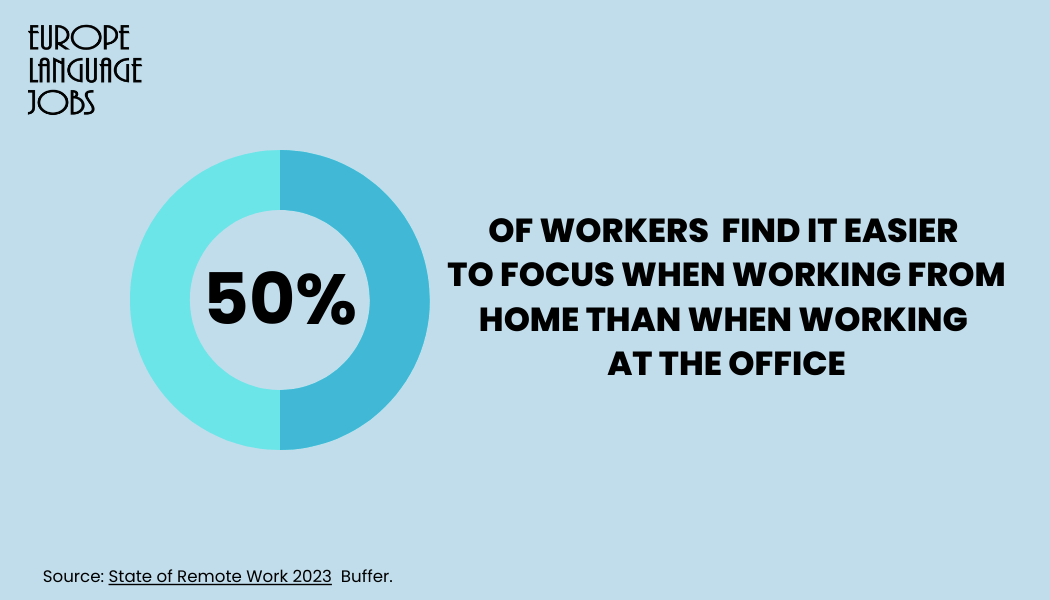
Surprisingly, only 16% report having severe difficulties focusing when working from home (Buffer). 77% of those who feel less productive at home say it’s because there are more distractions there, compared to the office (Owl Labs).
At Europe Language Jobs, we believe it is a matter of personal preferences. People are different: half of us are wired to work better on our own, and the other half needs to be surrounded by others to reach our top potential.
When making the decision about switching to remote work, ask yourself which group you belong to. Understanding yourself and the methods which work for you will help you avoid putting a strain on your mental health.
8. Limited career development
42% of workers worry that working remotely might impact their career progression (Owl Labs). This concern is strictly tied to being scared of not being heard, seen, or recognised by leadership.
Many people believe that managers and bosses might forget about certain employees if they don’t see them every day. Others aren’t confident that their job can be done remotely, as many professions still require face-to-face interactions.
But in fact, Buffer discovered that more remote workers observe more flexibility in career options (39%) than difficulties in being promoted (28%).
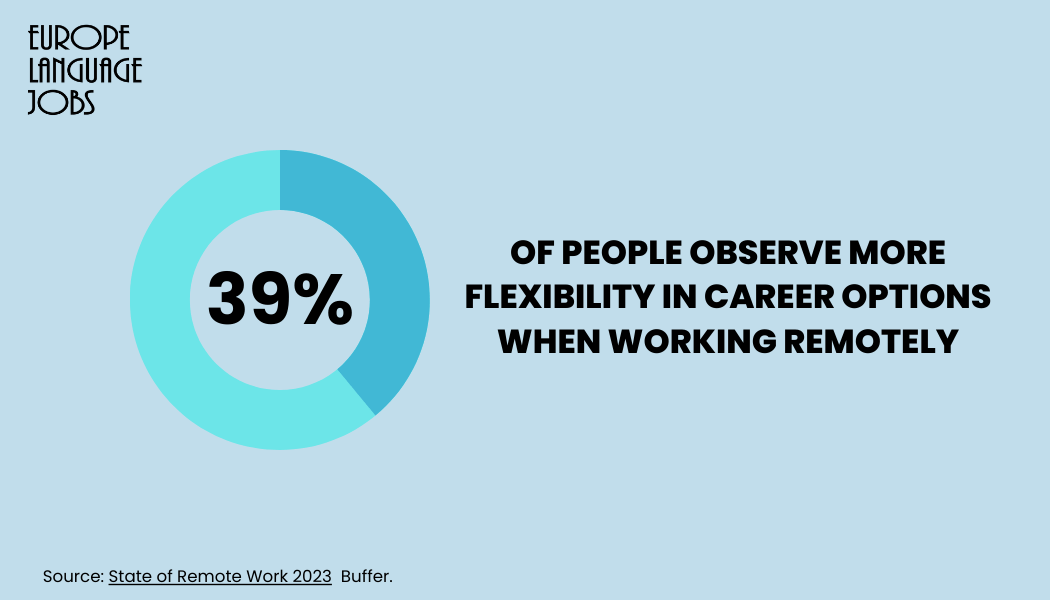
Additionally, 36% even believe that career progression is actually easier with remote work. 28% find it more difficult, and another 36% report no impact of working from home on their career growth (Buffer).
A study by Flexjobs supports that claim, with its own research identifying that 30% claim remote work has had a positive impact on their career development, and 28% observed no difference compared to when they used to work from the office.
9. Pay cuts
Finally, we approach the aspect which prevents us from taking most leaps - finances. Many undecided workers worry that the comfort of remote work might come at the cost of a lower salary.
But in fact, pay is not tied to the location of 43% of remote workers, and 70% are not paid less working from home than they were when they worked from the office. Only 35% report the influence of location on their wages (Buffer).
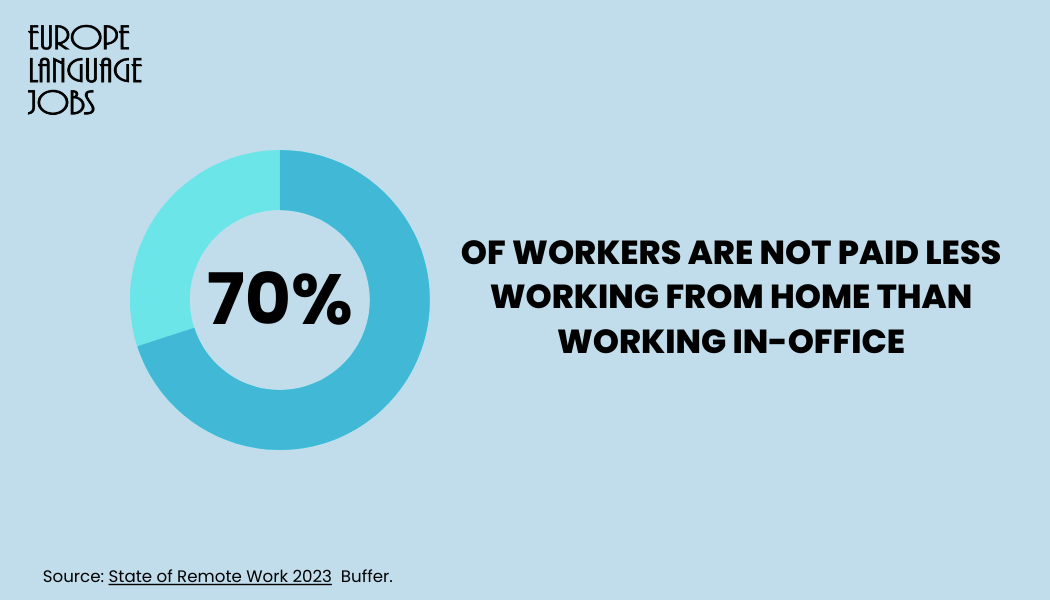
What’s more, 56% even claim that working remotely is better for them financially than working at the office (ibid). This has to do with the lack of exorbitant commute costs, saving on eating out at lunch with colleagues, or being able to choose somewhere less expensive to live when they aren’t tied to the location of their office.
Benefits of remote work
Now that we know the common concerns regarding working from home, let’s jump on to discussing the top benefits coming from remote work.
- Increased productivity
- Decreased burnout
- No need to commute
- Less stress
- Healthier food choices and increased exercise
- Improved personal relationships
1. Increased productivity
Ever since the boost of remote work, numerous studies have been carried out regarding the productivity of remote workers compared to their colleagues at the office. The results surprised everyone by proving that independent sources claim one and the same: working from home indeed has a positive impact on employee productivity.
What do the workers themselves say? Well, 62% of them claim they feel more productive when working remotely. Furthermore, 67% of remote workers find themselves more productive on the days they work at home than on those when they travel to the office (Owl Labs).
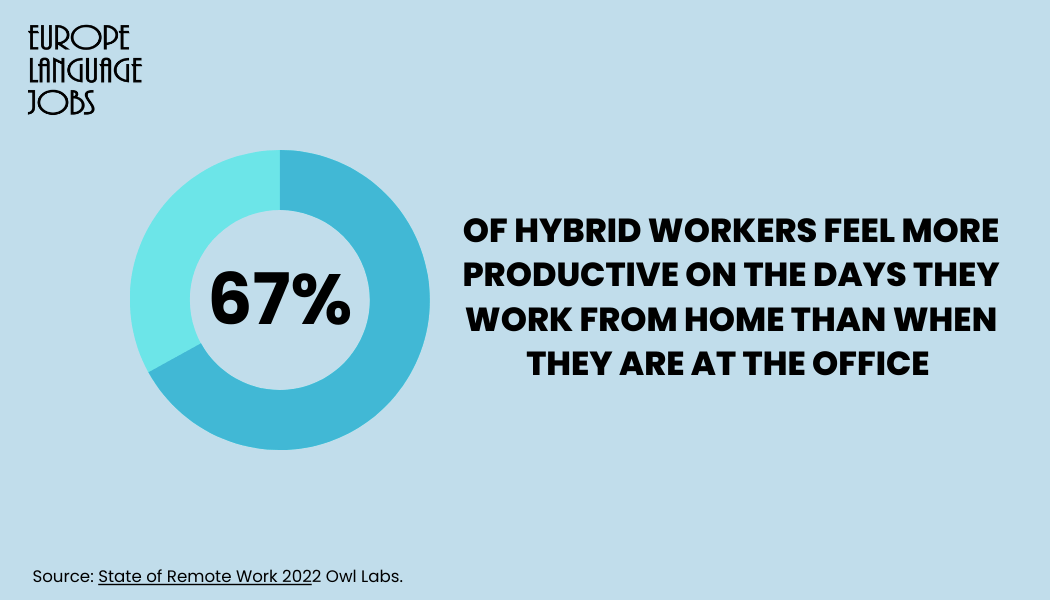
51% believe that working from home creates the perfect conditions for thinking creatively and boosts productivity in that area. When it comes to innovating and brainstorming, the opinions are split evenly, with 39% preferring the office, and 37% favouring their homes (ibid).
Only 16% report having difficulties focusing when working from home, while 70% believe focused work is easier at home, according to a study by Buffer. So, remote workers have spoken - remote work does wonders for one’s productivity, after all.
2. Decreased burnout
One may think that being confined to your home and not interacting with your colleagues every day might lead to burnout fairly quickly. And it is true that 1 in 5 (21%) of remote workers report feeling burned out (Buffer).
Staying motivated while working from home is a struggle for 20%. But every coin has two sides - 48% report feeling more energised (ibid). Over twice as many people feel more motivated while working from home than those who lack energy.
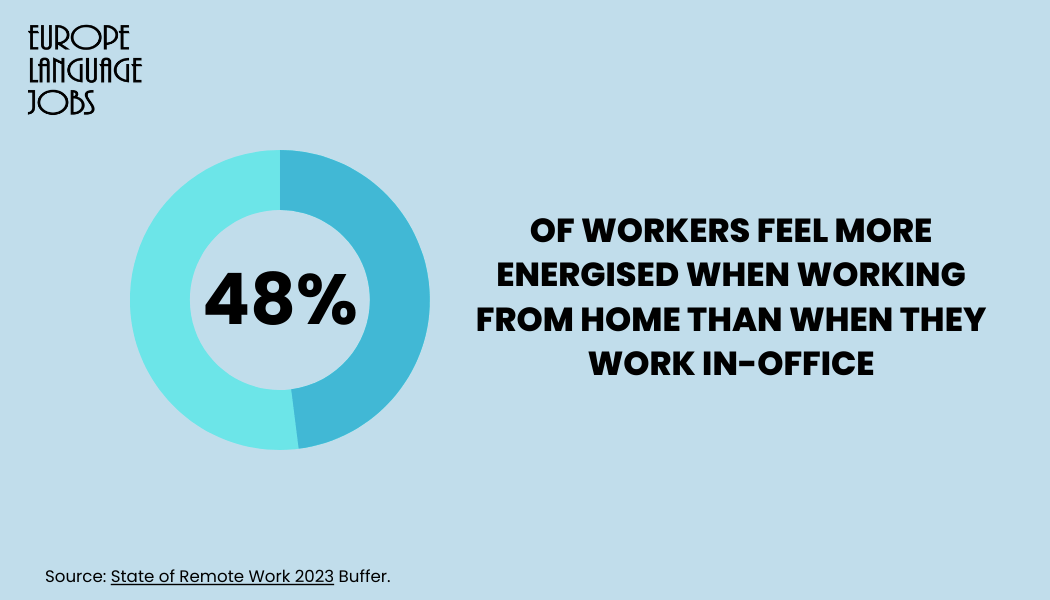
For 1 in 3 (31%), there is no difference. Where they work doesn’t impact how motivated they feel (ibid).
Perhaps the most convincing piece of data is that 58% of remote workers feel engaged in their jobs (ibid). A job is a job - hardly anyone is 100% excited at the prospect of working every single morning. But statistics prove that those who work from home are more excited than their colleagues at the office.
3. No need to commute
The daily commute takes up a huge chunk of our time - and funds. Research carried out by the Decker-Friedman Institute for Economics at the University of Chicago found that 10,000 respondents managed to save collectively 62.4 million hours by switching to remote work and ceasing to commute.
This comes up to 10,000 hours saved per person over a 6-month period of the study (March 2020 - September 2020). Just by stopping to commute to work every day.
All of this saved time can be dedicated to something we enjoy; which makes us happy and, therefore, works to protect our mental health. 63% of people who have more time because they don’t commute (Buffer) are happily engaging in their activities of choice, rather than driving or being crammed in a train or bus.
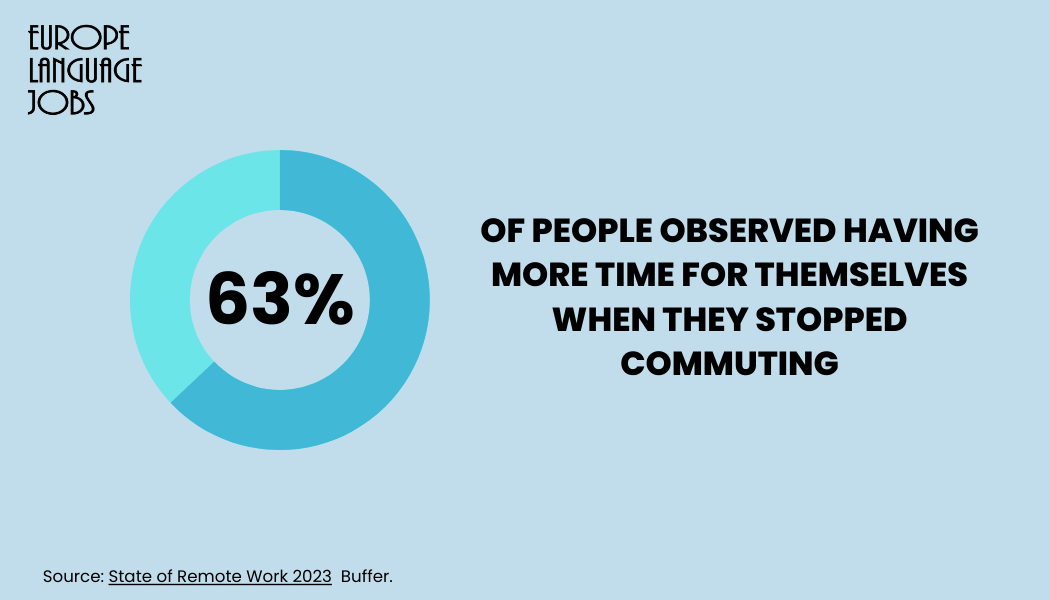
Additionally, 87% of workers agree that commuting impacts their stress levels to some degree (Flexjobs). Avoiding the anxiety related to heavy traffic, road conditions, and arriving late is a huge benefit for our fragile mental health.
4. Less stress
Commute is only the tip of the iceberg when it comes to stress-generating situations at work. A nervous atmosphere in the workplace, colleagues who had woken up on the wrong side of the bed, or an imposed tight daily schedule are just a few of the other hazards which disappear when we start working from home.
Decreased stress levels were named a top health benefit of working remotely in a study by Flexjobs, being named by nearly half (48%) of respondents.
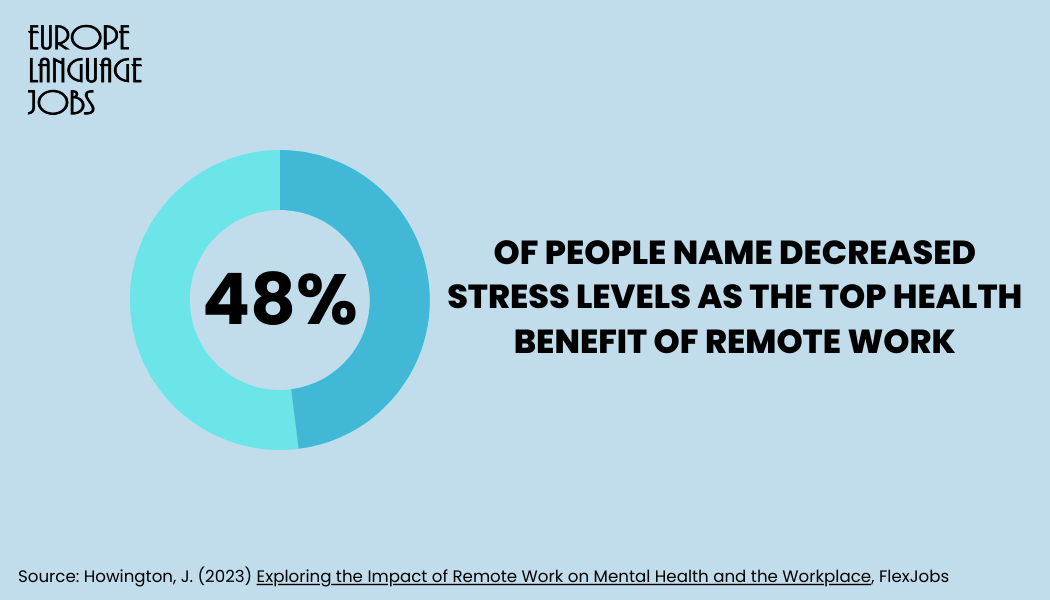
Of course, there are still certain rules we have to follow when working from home. Remote employees are still part of a company and should adhere to its regulations, but working from home usually allows a bit more freedom in deciding when and how we do things than working at the office.
5. Healthier food choices and increased exercise
It is no secret that mental health is directly tied to our physical health. When one decreases, the other automatically suffers as well. Finding a balance between caring for both is key to maintaining our well-being on a satisfying level.
The ease of eating more healthily and more opportunities for exercise were identified as some of the top benefits of remote work, being chosen by 35% and 30% of workers, respectively (Flexjobs).
Working at the office, we often give in to the temptation of going out for lunch. This is nice, but also comes with two disadvantages. The first is spending money, as prepping your own food is undoubtedly cheaper. The second is that eating out often facilitates making choices which may be delicious, but aren’t necessarily good for your health.
The time saved on commuting can be dedicated to cooking healthier meals or exercising. Working from home also makes it easier to leave your desk for 5 minutes at a time and stretch. Unfortunately, not all companies encourage breaks for physical exercise just yet, which has disastrous effects on our spines, eyesight, and mental health.
6. Improved personal relationships
Although maintaining close relationships with colleagues may be more difficult for some remote workers, improving personal ones is definitely easier when working from home.
1 in 4 workers (23%) considers improved personal relationships one of the top benefits of remote work (Flexjobs). On the one hand, working alongside your family or housemates may be distracting. Being around one another too much could also result in minor conflict.
But on the other hand, spending more time with them during the day can be also extremely beneficial for one’s mental health. Long commute times and even longer working hours oftentimes allow many of us to see our loved ones only in the evenings or during the weekend.
The opportunity to have lunch together and unwind from the reality of work during the day is priceless for many people. Knowing we can take better care of our personal relationships is a huge boost for our mental health.
The verdict
We have discussed both the top pros and cons of working from home identified by remote workers. But what is the conclusion? Is remote work more beneficial or damaging to our mental health?
Again, we will let the numbers do the talking.
This year, more respondents to the Buffer survey declared they prefer a fully remote structure than in the past years. After having experienced the good and the bad of remote work, 71% favoured working from the comfort of their home in 2023, compared to just 49% in 2022. This is an increase of 22 percentage points in just one short year.
For 1 in 3 workers (33%), remote work improved their overall mental health. For 28%, it has had a positive impact on their overall physical health (Flexjobs).
68% of remote workers describe their experience with working from home as very positive, and 23% claim they found it somewhat positive. This adds up to 91% of people working from home being satisfied with this lifestyle (Buffer).
Only 1% call their experience somewhat negative, while 0% describe it as very negative (ibid). A further 95% of the workforce wants some form of remote work, whether hybrid or fully remote (Flexjobs). They want it all - the good, the bad, and the ugly of working from home. And their number keeps growing.
And, finally, 96% firmly believe that remote or hybrid work arrangements would best support their mental health (Flexjobs). 98% of those already working from home would recommend remote work to others (Buffer).
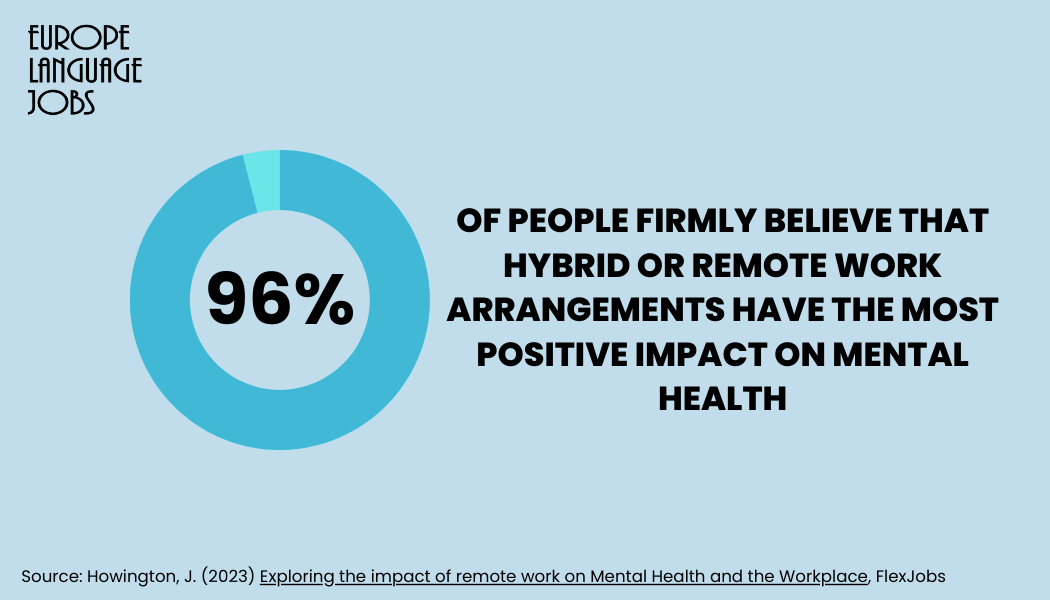
These statistics, coming straight from veterans in the remote work field, speak for themselves. If working from home was damaging to their mental health, the vast majority of them wouldn’t be recommending it to others. And they certainly wouldn’t be choosing to continue this lifestyle for themselves.
Therefore, for all the concerns it raises, the conclusion is that remote work is beneficial to our health. When faced with facts and the personal experiences of remote workers, common worries are often dissolved.
In the end, it is all about our personal preferences. Nobody knows you as well as you do, so before taking the leap into a fully remote lifestyle, ask yourself these questions:
-
Who am I as a person?
-
What are my values?
-
What methods work best for me?
-
What motivates me?
-
Do I work better individually, or as a part of a team?
-
Can I go a day without interacting with others face-to-face?
-
What are my priorities? My goals?
Being honest with yourself will present the answer you seek. Remember that the world is never black or white: you can head for the grey area and pick hybrid work. It connects the best of both worlds - gives you the freedom to work from home on some days, without forcing you to give up social interactions altogether.
The truth is that protecting our mental health is about understanding ourselves and fulfilling our needs. As soon as we identify them and take care to meet them, our quality of life will improve.
Have a look at some testimonials of remote workers interviewed by Flexjobs, sharing the positive impact working from home has had on their mental and physical health.
Last but not least - remember that everyone is different. You have the right to feel unhappy while working remotely, in a hybrid manner, or at the office. Remote work is a trend right now, which might make some of us feel obliged to find it enjoyable.
Although studies show that remote work is generally beneficial for our mental health, that doesn't mean you're not allowed to find it unpleasant. If you are experiencing burnout or general discomfort which doesn't go away, consult a specialist. Remember there are always people who can help you - your loved ones, colleagues, managers, or trained therapists.
You are never on your own. And feeling different from everyone else, feeling different than what statistics say, is always okay. Do what makes you happy and take care of your mental health. A job is replaceable - your health is not.
Sources:
-
Haan, K. (2023) Remote Work Statistics and Trends in 2023, Forbes.
-
Howington, J. (2023) Exploring the Impact of Remote Work on Mental Health and the Workplace, FlexJobs Job Search Tips and Blog.
-
Key Economic Findings About COVID-19 (2020) Becker Friedman Institute. quoted in Statistics on Remote Workers That Will Surprise You (2023) Apollo Technical LLC.
-
State of Remote Work 2022, Owl Labs.
-
State of Remote Work 2023, Buffer.
Feeling inspired? Visit our blog for more career advice! How can you be sure the information we provide is top-notch? We are a group of professionals working with recruiters, career coaches, and HR specialists from all over the world!
Trust our experience and let us help you find a new job in Europe!





































Ewa Kliks1y ago
My life definitely got easier when I started working from home :) Can't really believe a lot of companies are bringing back mandatory in-office work or hybrid model, that is painful! I'm so much better when working from home, less distractions, healthier mind :)
My life definitely got easier when I started working from home :) Can't really believe a lot of companies are bringing back mandatory in-office work or hybrid model, that is painful! I'm so much better when working from home, less distractions, healthier mind :)